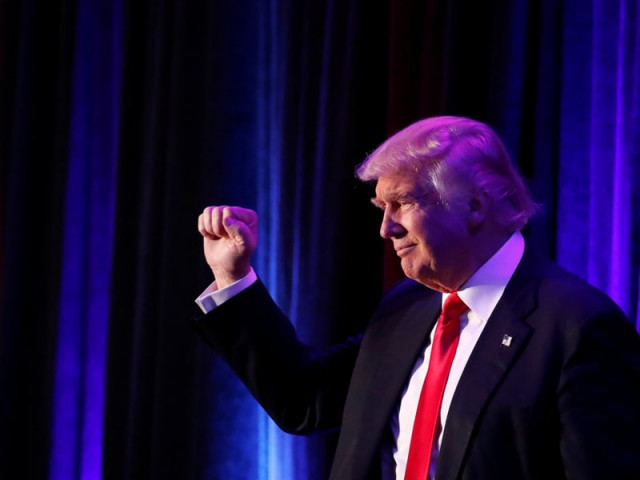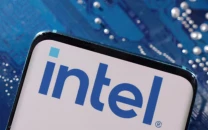What tech industry could face under Trump’s presidency
For tech industry giants who took on the president-elect during his presidential campaign, future looks uncertain

Earlier, the president-elect Donald Trump said he would impose a 35% tax on American companies that move jobs abroad if elected as president. PHOTO: REUTERS
For tech industry giants who took on Trump during his presidential campaign, future at best looks uncertain as Trump’s stances on issues like free trade, encryption and network neutrality will soon collide with widely held views in Silicon Valley. During his election campaign, the president-elect also threatened some of the industry’s biggest players over these issues.
Here are some of the problems that tech industry might face under President Trump:
Apple’s overseas manufacturing
Overseas manufacturing units of tech companies like Apple’s would be on Trump’s radar as he had promised during his campaign to curb the outsourcing of jobs. “We’re gonna get Apple to start building their damn computers and things in this country, instead of in other countries,” he said in January.
Trump’s statement on banning Muslims from US disappears from his website
Hinting hard at how he plans to do that, Trump while criticising IBM last week said, he would impose a 35% tax on American companies that move jobs abroad if elected as president. “A Trump administration will stop the jobs from leaving America,” he said, adding, “We will make them pay a 35% tax.”
Amazon’s Jeff Bezos also on target
Apple is not the only tech company in the bad books of the newly elected US president. he has repeatedly attacked Amazon’s boss Jeff Bezos over his purchase of the Washington Post.
Accusing Bezos of acquiring the newspaper to garner the political influence, Trump said, “He’s using the Washington Post for power so that the politicians in Washington don’t tax Amazon like they should be taxed.” Further, he claimed, “Amazon is getting away with murder tax-wise.”
The new president also claimed that Amazon CEO has taken issue with him because he fears a Trump administration might use antitrust laws to pursue Amazon. “He thinks I’ll go after him for antitrust, because he’s got a huge antitrust problem because he’s controlling so much, Amazon is controlling so much of what they are doing.”
A push for encryption backdoors
When Apple refused court’s order to help FBI bypass the iPhone belonging to one of the attackers of San Bernardino shooting that killed 14 people, saying that unlocking an iPhone in the name of fighting terrorism would be “bad for America, much of the tech industry stood behind it.
Unlocking San Bernardino iPhone would be 'bad for America'
Trump slammed Apple for not complying with a judge’s order to bypass the phone’s security. In February, he said, “But to think that Apple won’t allow us to get into her cell phone…. who do they think they are? No, we have to open it up.” He even called for the boycott of Apple’s products.
He hinted that his administration would force companies to weaken their own security products in order to give law enforcement special access.
Legal hurdles for transfer of internet oversight to a global body
As a part of the move to make the internet as a truly global, open network, beyond the control of national governments including the United States, an international non-profit organisation called Internet Corporation for Assigned Names and Numbers (ICANN) was given management responsibility.
US prepares to cede key role for internet
Since 1998, ICANN has been responsible for overseeing the web’s global domain naming system — which allows us to connect to unique web addresses from anywhere in the world.
But Trump wants the US to retain control. “Donald Trump is committed to preserving internet freedom for the American people and citizens all over the world,” Stephen Miller, the national policy director for the Trump campaign, said in September.
The newly-elected president might support legal efforts to stymie the transition, despite it being backed by tech giants like Google, Facebook, Twitter and Amazon.
Google, Facebook, Twitter accused of partiality
Trump accused Google, Facebook and Twitter of favouring his political opponent and Democratic candidate Hillary Clinton. In September, he claimed that the search engine was suppressing news regarding the FBI’s investigation into Clinton’s use of a private email server, while Facebook and Twitter were co-conspirators in the effort and called them “dishonest media”.
“Wow, Twitter, Google and Facebook are burying the FBI criminal investigation of Clinton. Very dishonest media!” Trump tweeted.
Network neutrality
Despite the ruling of a federal appeals court saying that regulators have the authority to enforce open internet rules, banning internet service providers from favouring or blocking content or apps, Congressional Republicans have still been opposing the net neutrality and a legal challenge over the issue may wind up in the Supreme Court.
In landmark ruling, FCC decides to on 'fast, fair and open' internet
Although Trump did not raise the issue during his election campaign, he had opposed the net neutrality calling the open internet rules supported by president Obama, the Federal Communications Commission, and much of the tech industry as a form of censorship, akin to old broadcasting rules.
“Obama’s attack on the internet is another top-down power grab,” Trump tweeted in November 2014. “Net neutrality is the Fairness Doctrine. Will target conservative media,” he claimed.
As president, Trump would appoint a new chair to the FCC, who might reverse network neutrality.
This article originally appeared on BuzzFeed


















COMMENTS
Comments are moderated and generally will be posted if they are on-topic and not abusive.
For more information, please see our Comments FAQ